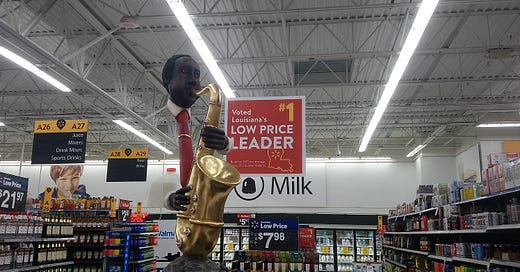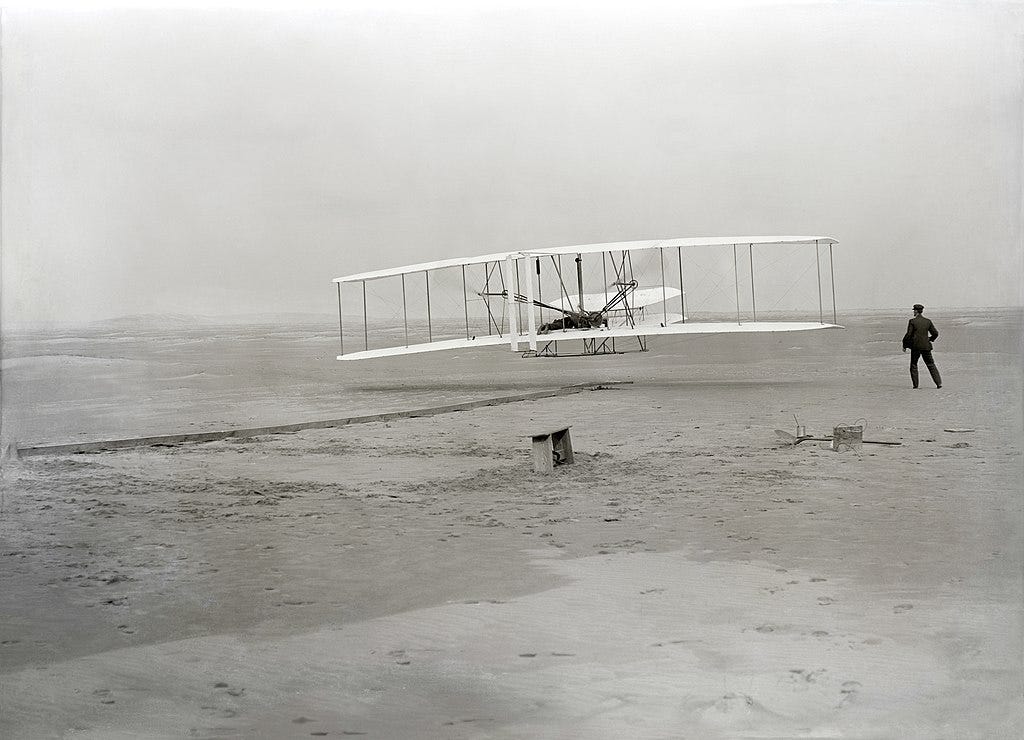TSDK No. 26. Unwritten Masterpieces II: Across America By Walmart
From The Flaneur of Utter Destruction
A few years ago, I was reading my mother-in-law’s People magazine when I stumbled upon a short article about a teenager who had lived in a Walmart for a several days. Perhaps it was 48 hours, possibly a week, but no longer than that. There wasn’t much else to the story: essentially, the boy had found some dark corner of the store and concealed himself there each night before closing, and then gone to sleep. Whether he had hidden behind some diaper boxes or under a couch in the home office section, I can no longer recall; the key detail is that he did nothing interesting once he was in there. He didn’t redecorate the changing rooms, or put meat sticks inside the bananas, or slip cryptic messages into the books and magazines. He had no sociopolitical comment whatsoever to make about Walmart. All he did was hang out between the aisles and exist.
It seemed like a missed opportunity, and yet somehow the boy had managed to option a screenplay about his experience to a Hollywood studio: It’s like The Terminal only instead of Tom Hanks playing an Eastern European refugee trapped in an airport, it’s about a horny American teen who hides out in a supermarket! In fact, I have no idea whether the boy was horny or not, but he must have added some details to sell so pointless a story. Perhaps in the script he went undercover to capture a serial killer who was poisoning the peanut butter, or it was all part of an elaborate scheme to win the heart of the cute girl stacking the toilet paper shelves. Even so, I couldn’t see why anyone had paid him money for it: Kid’s parents must have connections, I thought.
And yet, despite my general disdain, I did appreciate the stunt’s radical meaninglessness. In those days, you see, despising Walmart was very much in vogue, a sign that you were a good person with the correct attitudes. Media organizations on the right side of history would run articles criticizing Walmart for its rapacity, cheapness and offensive ubiquity, while people living in elite neighborhoods would sign petitions if it looked as though a supercenter might be likely to move in next door. Naturally, these protestations were always framed as springing from a deep concern for the survival of the local grocery store, although curiously nobody ever objected to the opening of a Randall’s or Trader Joe’s, which were also large corporations that put plucky little shops out of business. The website People of Walmart was at least honest: it openly encouraged you to deride the poor, the obese and the badly dressed, while also sparing you from having to get close to them.
I, on the other hand, rather liked Walmart. It made a favorable impression on me the very first time I stepped inside a supercenter in 2002, while on a visit to Texas from Moscow, where I was living at the time. Perhaps the fact that I had spent the past five years in the former eastern bloc had something to do with the amazement I felt. Those were lands of scarcity, but this — this was like nothing I had ever seen before, a horn of plenty as huge as an aircraft hangar, set against a blank landscape of scrub and sky. Everything you needed was there, from bread to Barbies, from condoms to car batteries, from gum to guns. Indeed, you could pick up a pack of Huggies baby wipes and an AR-15 on the same shopping trip. Truly, I had reached the omega point of capitalism.
Then, when I moved to America permanently a few years later, I also came to appreciate that Walmart was open very late; in some locations it never closed. If it was 2AM and you urgently needed to buy a scientific calculator and a 5-hour energy drink then you could do it.
This dedication to unceasing service stood me in good stead when I was in the process of becoming an American citizen. As Austin doesn't have an immigration office, I had to drive to the one in San Antonio which is about two hours away if you travel in the hours of darkness when only drug traffickers are on the Interstate-35, and considerably longer at almost any other time. Since my interview was early in the morning, I decided to spend the night. However, once I had checked into my room I realized that I had neglected to pack either toothpaste or pajamas. The thought of sleeping in the scud1 and doing my immigration interview with furry teeth was unappealing. Fortunately, there was a Walmart across an immense parking lot adjacent to the hotel and, although it was approaching midnight, it was still open. Inside I found a “wife beater” shirt with a picture of a llama wearing sunglasses on it, a pair of tracksuit bottoms, some Colgate and a toothbrush. Feeling more appreciative of Walmart than ever, I returned to my room.
But these low priced goods were not all that I had brought back with me. Perhaps it was my proximity to the Alamo, that heavily trafficked shrine dedicated to Texas independence and the extraction of the tourist dollar, but suddenly I had an idea for a book. It was called Across America by Walmart, and in it I would describe a tour of all the most aggressively commercialized landmarks in America and their nearest Walmarts. If a landmark did not have a Walmart within, say, five miles then it would be excluded. That might mean I would end up missing out on the Golden Gate bridge and the Seattle space needle, but I still anticipated that there would be plenty of places left over: civil war battlefields in Virginia, maybe Mount Rushmore, wherever it was that the Wright Brothers flew the first airplane, Los Alamos, Area 51, Three Mile Island and definitely Route 66 — there would probably be a lot of Walmarts along Route 66.
Kill Devil Hills, North Carolina: I would only go there, but only if there was a Walmart nearby.
I wasn’t exactly sure what Across America by Walmart was about, although there would obviously be plenty of scope to explore extreme commercialization inside highly artificial environments; I also liked the contrast between enclosed, retail zones and heavily trafficked patches of grass and field where something happened long ago. There was a certain relentlessness to the concept that appealed to me: I imagined that by my 20th or 30th Walmart I would be quite bored of standing under the artificial lights, but it was then in my state of exhaustion that I might stumble upon something unique — the disembodied head and hands of a jazz musician in a New Orleans supercenter, say, or a metal flamingo with a crooked beak in Jacksonville.
By ruthlessly subjecting myself to an endless succession of dull visitor centers and enormous air-conditioned boxes loaded with cheap goods I would pursue Rimbaud’s systematic derangement of the senses. At the end of my journey, I hoped to achieve a state of delirium, a half-dreaming, half-awake condition in which I was no longer certain what was real and what was imagined; and the great men and women of American history would stand behind me in a hallucinatory conga-line as I purchased a pack of Tic-Tacs at the self-checkout.
Sitting there in my hotel room I thought for perhaps a whole second, or even two, that it was just about possible that Across America by Walmart could exist. The problem was that it could not exist in a form of which I approved, as a record of an extreme existential experiment in boredom and repetition. To sell it to a publisher, I would probably have to frame it as a lament for the disappearance of the local grocery store and mount a scathing attack on the easy availability of cheap goods for poor people. Or, if I wanted to go lowbrow, I could make a bunch of jokes about fatties with ugly tattoos poking out of their ass cracks.
But I didn’t want to do that; I wanted to explore the American landscape through an arbitrary and largely meaningless principle, just as that boy had slept in a Walmart for no good reason all those years earlier. But even if I could do it my way, it would be a hard sell at home: “Hi honey, do you mind keeping an eye on the kids while I spend the next six months traveling around America visiting Walmarts and overexposed tourist attractions so that I can create a bizarre literary artifact that will irritate more people than it could ever delight? Not that I expect many to read it, of course.”
No, this was a book that could only exist in my mind, unwritten, unrealized. And that is where I left it — until today, that is, when I also planted it in your mind.
Read about another unwritten masterpiece, “Great Parking Lots of America” here.
Thank you for reading Thus Spake Daniel Kalder. Hit the like and share buttons to help spread the word to the uninitiated. Also, don’t forget to subscribe if you haven’t done so already. Regards, DK.
Naked (Scots)





